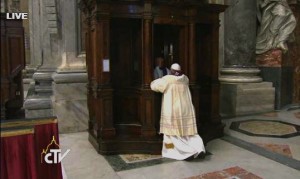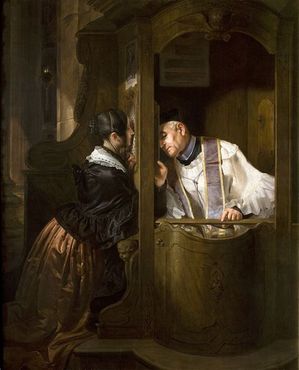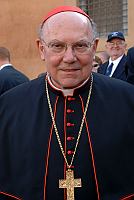 The Pope gave a teaching on the sacrament of Confession. He has three points. Remember the Pope has a central emphasis for his ministry: MERCY. Today, begins a concerted effort on the part of the Bishop of Rome to encourage ALL priests to assist the faithful in this ministry of love and to embrace this gift given by the Lord. I think Pope Francis is quite clear, don’t you?
The Pope gave a teaching on the sacrament of Confession. He has three points. Remember the Pope has a central emphasis for his ministry: MERCY. Today, begins a concerted effort on the part of the Bishop of Rome to encourage ALL priests to assist the faithful in this ministry of love and to embrace this gift given by the Lord. I think Pope Francis is quite clear, don’t you?
“24 hours for the Lord” is an initiative of Pope Francis to make room for the reception of Confession. Here is a video clip of the pope doing what he’s been teaching.
The Pope taught:
In the period of Lent, the Church, in the name of God, renews the call to conversion. It is the call to change one’s life. Conversion is not a matter of a moment or a year, is a commitment that lasts a lifetime. Who among us can be assumed not to be a sinner? No one. The Apostle John writes: “If we claim to be without sin, we deceive ourselves and the truth is not in us. If we confess our sins, He is faithful and righteous so as to forgive us our sins and to cleanse us from all unrighteousness (1 John 1:8-9).” This is what happens in our celebration and throughout this day of penance. The Word of God we have heard introduces us to two essential elements of the Christian life.
The first: put on the new man. The new man, “created according to God(Eph 4:24),” is born in Baptism, where one receives the very life of God, which makes us His sons and incorporates us into Christ and his Church. This new life allows one to look at reality with different eyes, without being distracted by things that do not matter and cannot last long. For this we are called to abandon sinful behaviour and fix our gaze on that, which is essential. “Man is more precious for what he is than for what he has. (Gaudium et Spes, 35)” Behold the difference between the life deformed by sin and the life illumined by grace. From the heart of the man renewed according to God come good behaviors: always to speak with truth and avoid any lie; to steal not, but rather to share what you have with others; especially with those in need; not to give in to anger, resentment and revenge, but to be gentle, magnanimous and ready to forgive; not to fall into backbiting that ruins people’s good name, but to look more rather on each person’s positive side.
 The second factor [is]: Remain in my love. The love of Jesus Christ lasts forever, will never end because it is the very life of God. This love conquers sin and gives strength to get up and start anew, because with pardon the heart is renewed and rejuvenated. Our Father never tires of loving and His eyes did not grow heavy in looking at the way home, to see if his Son who left and was lost will return. And this Father does not tire of loving even His other son, who, though he remains ever in the house with Him, nevertheless does not take part in His mercy, His compassion. God is not only the source of love, but in Jesus Christ calls us to imitate his own way of loving: “As I have loved you, so you also should love one another. (Jn 13:34)” To the extent that Christians live this love, they become credible disciples of Christ in the world. Love cannot stand to remain locked up in itself. By its very nature [Love] is open, it spreads and is fruitful, [it] always generates new love.
The second factor [is]: Remain in my love. The love of Jesus Christ lasts forever, will never end because it is the very life of God. This love conquers sin and gives strength to get up and start anew, because with pardon the heart is renewed and rejuvenated. Our Father never tires of loving and His eyes did not grow heavy in looking at the way home, to see if his Son who left and was lost will return. And this Father does not tire of loving even His other son, who, though he remains ever in the house with Him, nevertheless does not take part in His mercy, His compassion. God is not only the source of love, but in Jesus Christ calls us to imitate his own way of loving: “As I have loved you, so you also should love one another. (Jn 13:34)” To the extent that Christians live this love, they become credible disciples of Christ in the world. Love cannot stand to remain locked up in itself. By its very nature [Love] is open, it spreads and is fruitful, [it] always generates new love.
Dear brothers and sisters, after this celebration, many of you will make yourselves missionaries to the experience of reconciliation with God. “24 hours for the Lord” is an initiative in which many dioceses all over the world are participating. To everyone you meet, you will communicate the joy of receiving the Father’s forgiveness and regaining full friendship with Him. The one who experiences the mercy of God, is driven to be the creator of mercy among the poor and the least. In these “littlest brothers and sisters” Jesus waits for us (cf. Mt 25:40). Let us go to meet them! And we will celebrate Easter in the joy of God!
 The Great Fast is a time for change. We try to spend more time focused on how to please God and others. When things take us away from God, we can sin. We need to confess our sins to God and change the things that lead us to sin. This is called “repentance.”
The Great Fast is a time for change. We try to spend more time focused on how to please God and others. When things take us away from God, we can sin. We need to confess our sins to God and change the things that lead us to sin. This is called “repentance.”




